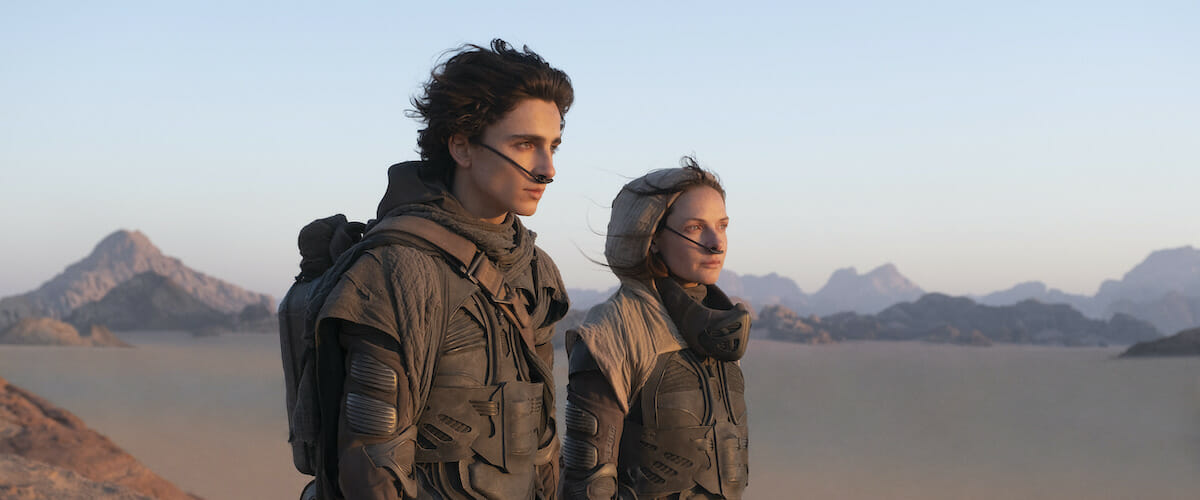Here’s another adaptation of the unadaptable Dune. Director Denis Villeneuve, who dipped his whole body into big-idea sci-fi with Arrival and Blade Runner 2049, has a surefire strategy for wrangling the labyrinthine novel onto the screen: cut the story in half. It’s an approach usually reserved for studios wringing money out of a YA franchise, but according to Villeneuve, Dune requires it. Warner Bros. has done a terrible job of marketing Dune as half the novel, though, so expect some frustrated groans when the Part One subtitle fades in like a last-minute apology.
Part of the reason why Dune is such a daunting work to adapt is its dense, complicated plot. So let’s try to summarize the setup in a paragraph: in the (very) distant future, the galaxy has resorted to feudalism to keep its planets under control, spearheaded by a ruthless, powerful empire. The emperor has placed House Harkonnen (brutal, bald bad guys) in charge of Arrakis, a hostile desert planet and the only source of “the spice”, a psychotropic drug that doubles as the sole means for interstellar travel. The Fremen, spiced-up natives of Arrakis, aren’t treated well by the Harkonnens—but in a surprise shift, the emperor transfers control of Arrakis to House Atreides (noble good guys with beautiful hair). Paul Atreides—our protagonist—is next in line to lead his House, and his father Leto mentors him accordingly. Paul’s mother Jessica, however, is a member of the Bene Gesserit, a sisterhood of space witches that manipulates politics from the shadows. Her plans for Paul are a little more intricate, and they begin with his arrival on Arrakis.
READ ALSO: ‘Blade Runner 2049’ brings you back to the world of sci-fi noir
The sheer amount of story can be overwhelming, but Dune streamlines it to the point that it’s accessible, carrying the overwhelm over to the visual side. The scale of this thing is off the charts. The visual effects are as top-notch as you’d expect out of a budget in the hundreds of millions, but it’s the way Villeneuve frames the universe that lends it true grandiosity. Landscapes and backdrops concede their space to mechanistic behemoths. Wide shots are frequently used indoors, straining to contain vast, expansive structures in all their exquisite detail. Production designer Patrice Vermette, who’s been realizing Villeneuve’s visions since 2013’s Prisoners, has outdone himself—and many of his contemporaries.
DP Greg Frasier shoots Dune like Roger Deakins might’ve, toeing the line between bold compositions and naturalistic lighting. One might think this approach to lighting would render the film dull, given the desert setting, but the endless browns of Arrakis help bring out the reds: the vibrant stains of fire and blood. In concert with aggressive editing choices that stress danger, intensity, and anger, Dune’s images aren’t just visually arresting—they’re downright enrapturing.
The script is forgiving if you get lost in the sights. For such a dense plot, there’s surprisingly little exposition to hear out. What needs explanation is explained with economy, and what can be intuited is left to be so. Dune’s screenplay is a triumph of editing: the narrative builds, crescendos, and falls quite naturally, filtering the novel for its essence as much as its critical plot beats. Fans of the book won’t feel like anything was lost, and newcomers to Dune won’t feel lost—but that only pertains to the story’s surface.
Though the narrative satisfies even when bisected, its subtext feels inchoate. In building up to a suitable stopping point instead of a well-rounded ending, the ideologies of the novel are reduced to chess pieces—philosophies valued for their role in getting the protagonist from A to B, not for their potential to provoke discussion and dissection. A meaningful exploration of how belief shapes reality isn’t possible yet, and it might be unwise to try. The novel deals with contentious topics from eugenics to jihad—following those threads without a clear sense of where they lead could invite drastic misinterpretation. Rather than run that risk, Dune relegates its biggest ideas to implications and lore. Dune isn’t a film you wrestle with, which could never be said of its source material. The film’s subtext is a mere syllabus for a course yet to play out.
Could this have been avoided? The first hour could’ve been condensed into a Star Wars-style opening crawl, leaving room to turn the rest of the novel into a 3.5-hour movie, but that’d anger Dune fans who’d been clamoring for a thorough adaptation. Perhaps a five-hour movie could fit everything Villeneuve intended, but a movie that long would never turn a profit in theaters. A miniseries, then? Villeneuve would never—he’s been adamant that Dune be seen on the biggest screen possible.
Maybe we’ve been too quick to declare the novel unadaptable. If anything, the barriers to an ideal adaptation are the state of the industry, demands of the fans, and conventions of the medium. In all fairness, Villeneuve’s Dune might be the best version that these constraints allow—but it’s not a movie that thinks outside of the box. Is it ambitious? Undeniably. Is it daring? Not especially.
★★★½ (3.5/5)




